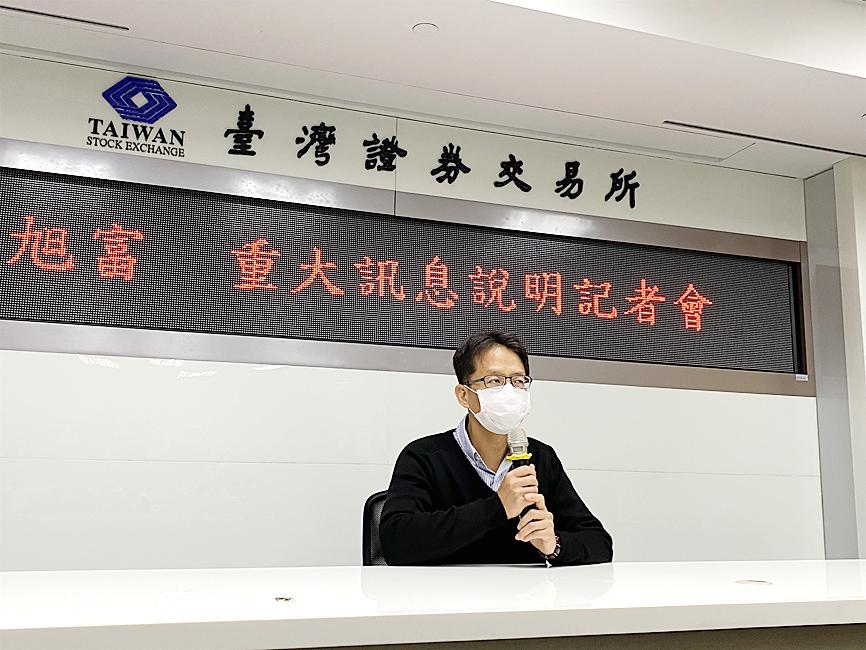Shares of drug developer SCI Pharmtech Inc (SCI, 旭富製藥) yesterday plunged by their daily limit to NT$112 after a fire broke out on Sunday at the company’s plant in Taoyuan’s Lujhu District (蘆竹), killing a Filipino worker and causing about NT$800 million (US$28.05 million) in losses.
The fire began at about noon when the production lines were processing chemical solutions, the Taoyuan-based company said.
Because of the chemicals stored in the plant and strong winds, sporadic explosions occurred and the blaze soon spread to the factories of four other companies.

Photo: CNA
Taoyuan firefighters said they expect to bring the fire under control this afternoon.
SCI Pharmtech spokesman Deiter Yang (楊文禎) told a news conference yesterday that a Filipino worker died early yesterday after being treated for third-degree burns covering 90 percent of his body.
Another employee, a Taiwanese man, was discharged from hospital after being treated for burns to his hand, Yang said.
The company estimated about NT$800 million in losses because of damage to its plant, but added that it should be able to obtain full compensation from insurance companies.
Still, it would take at least six months to rebuild the plant, as most production lines were damaged by the fire, it said.
It estimated another NT$600 million in lost orders in the first quarter, Yang said.
The company has about NT$250 million in finished products, but it needs to assess their quality after the fire, he added.
The Lujhu plant employs about 270 workers, who will all be paid in full up to the Lunar New Year holiday in February, Yang said.
As production has been suspended, the company would evaluate whether it needs to adopt furlough programs, he said.
The fire also damaged the factories of Tao Yuan Paper Manufacturing Co (桃園紙廠), Tung Yang Machine Industry Co (東陽精機), Gwo Chern Industrial Co (國晟工業) and Hong Li International Knitting Co (鴻利國際針織).
SCI Pharmtech is waiting for damage reports from the four before it could determine compensation, Yang said.
The company has NT$30 million in public liability insurance claims for damage to nearby factories, he added.
A subsidiary of local conglomerate Mercuries & Associates Ltd (三商行) and led by chairman Wong Wei-chyun (翁維駿), SCI Pharmtech produces active pharmaceutical ingredients (APIs), cannabidiol intermediates and specialty chemicals.
The company reported cumulative revenue of NT$2.61 billion in the first 11 months of this year, up 18.19 percent from NT$2.21 billion in the same period last year, thanks to steady shipments of APIs for hydroxychloroquine — a medicine used to treat or prevent malaria, lupus and rheumatoid arthritis, as well as mild cases of COVID-19 — and stable sales of other APIs used in drugs for treating epilepsy and depression.
Net profit in the first three quarters of this year was NT$638.92 million, compared with NT$481.6 million in the same period last year, or earnings per share of NT$8.04, compared with NT$6.06 a year earlier, company data showed.
As of yesterday, the company’s shares had risen 2.75 percent this year, underperforming the main bourse, which rose 19.9 percent, Taiwan Stock Exchange data showed.

SECURITY: As China is ‘reshaping’ Hong Kong’s population, Taiwan must raise the eligibility threshold for applications from Hong Kongers, Chiu Chui-cheng said When Hong Kong and Macau citizens apply for residency in Taiwan, it would be under a new category that includes a “national security observation period,” Mainland Affairs Council (MAC) Minister Chiu Chui-cheng (邱垂正) said yesterday. President William Lai (賴清德) on March 13 announced 17 strategies to counter China’s aggression toward Taiwan, including incorporating national security considerations into the review process for residency applications from Hong Kong and Macau citizens. The situation in Hong Kong is constantly changing, Chiu said to media yesterday on the sidelines of the Taipei Technology Run hosted by the Taipei Neihu Technology Park Development Association. With

CARROT AND STICK: While unrelenting in its military threats, China attracted nearly 40,000 Taiwanese to over 400 business events last year Nearly 40,000 Taiwanese last year joined industry events in China, such as conferences and trade fairs, supported by the Chinese government, a study showed yesterday, as Beijing ramps up a charm offensive toward Taipei alongside military pressure. China has long taken a carrot-and-stick approach to Taiwan, threatening it with the prospect of military action while reaching out to those it believes are amenable to Beijing’s point of view. Taiwanese security officials are wary of what they see as Beijing’s influence campaigns to sway public opinion after Taipei and Beijing gradually resumed travel links halted by the COVID-19 pandemic, but the scale of

A US Marine Corps regiment equipped with Naval Strike Missiles (NSM) is set to participate in the upcoming Balikatan 25 exercise in the Luzon Strait, marking the system’s first-ever deployment in the Philippines. US and Philippine officials have separately confirmed that the Navy Marine Expeditionary Ship Interdiction System (NMESIS) — the mobile launch platform for the Naval Strike Missile — would take part in the joint exercise. The missiles are being deployed to “a strategic first island chain chokepoint” in the waters between Taiwan proper and the Philippines, US-based Naval News reported. “The Luzon Strait and Bashi Channel represent a critical access

Pope Francis is be laid to rest on Saturday after lying in state for three days in St Peter’s Basilica, where the faithful are expected to flock to pay their respects to history’s first Latin American pontiff. The cardinals met yesterday in the Vatican’s synod hall to chart the next steps before a conclave begins to choose Francis’ successor, as condolences poured in from around the world. According to current norms, the conclave must begin between May 5 and 10. The cardinals set the funeral for Saturday at 10am in St Peter’s Square, to be celebrated by the dean of the College